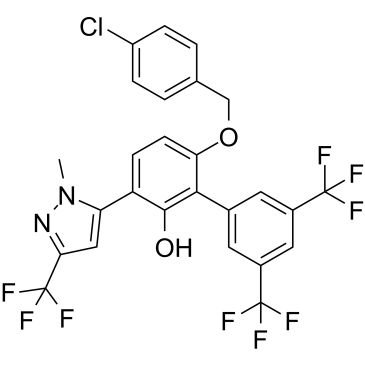| Cas No.: | 2289690-31-7 |
| Chemical Name: | 6-((4-chlorobenzyl)oxy)-3-(1-methyl-3-(trifluoromethyl)-1H-pyrazol-5-yl)-3',5'-bis(trifluoromethyl)-[1,1'-biphenyl]-2-ol |
| Synonyms: | MYCi361; MYC-i361; MYC i361; NUCC-0196361; NUCC 0196361; NUCC0196361; |
| SMILES: | ClC1C([H])=C([H])C(=C([H])C=1[H])C([H])([H])OC1C([H])=C([H])C(C2=C([H])C(C(F)(F)F)=NN2C([H])([H])[H])=C(C=1C1C([H])=C(C(F)(F)F)C([H])=C(C(F)(F)F)C=1[H])O[H] |
| Formula: | C26H16ClF9N2O2 |
| M.Wt: | 594.8616 |
| Purity: | >98% |
| Sotrage: | 2 years -20°C Powder, 2 weeks 4°C in DMSO, 6 months -80°C in DMSO |
| Publication: | [1]. Han H, et al. Small-Molecule MYC Inhibitors Suppress Tumor Growth and Enhance Immunotherapy. Cancer Cell. 2019 Nov 11;36(5):483-497.e15. |
| Description: | MYCi361 (NUCC-0196361) is a MYC inhibitor with the Kd of 3.2 μM for binding to MYC. MYCi361 (NUCC-0196361) suppresses tumor growth and enhances anti-PD1 immunotherapy[1]. |
| In Vivo: | MYCi361 inhibits MYC-dependent tumor growth in vivo. MYCi361 treatment (100 mg/kg/day for 2 days; then 70 mg/kg/day for 9 days) induces tumor regression in FVB or NSG male mice[1]. MYCi361 has moderate terminal elimination half-life of 44 and 20 h for intraperitoneal (i.p.) or oral (p.o.) dosing in mice, respectively[1]. MYCi361 suppresses tumor growth in mice, increases tumor immune cell infiltration, upregulates PD-L1 on tumors, and sensitizes tumors to anti-PD1 immunotherapy. However, MYCi361 demonstrates a narrow therapeutic index. An improved analog, MYCi975 shows better tolerability[1]. Animal Model: FVB or NSG male mice of 6-8 weeks of age and 25 g bearing established MycCaP tumors[1] Dosage: 50 mg/kg and 70 mg/kg Administration: Treatment i.p. initially at 50 mg/kg twice daily for 2 days, then 70 mg/kg/day for 9 days Result: Induced tumor regression. Animal Model: C57BL/6 mice[1] Dosage: 50 mg/kg (Pharmacokinetic analysis) Administration: Treated p.o. or i.p.; 24 hours Result: Intraperitoneal (i.p.) or oral (p.o.) dosing in mice indicated plasma half-lives of 44 and 20 h, respectively, with maximum plasma concentrations (Cmax) of 27,200 ng/mL (46 μM) i.p. and 13,867 ng/mL (23 μM) p.o.. |
| In Vitro: | MYCi361 inhibits the viability of MYC-dependent cancer cells including prostate cancer (MycCaP, LNCaP, and PC3), leukemia (MV4-11), lymphoma (HL-60 and P493-6), and neuroblastoma (SK-N-B2) with low-micromolar IC50 values[1]. Cell Proliferation Assay[1] Cell Line: The prostate cancer (MycCaP, LNCaP, and PC3), leukemia (MV4-11), lymphoma (HL-60 and P493-6), and neuroblastoma (SK-N-B2). Concentration: 1.4-5.0 μM Incubation Time: 5 days Result: IC50s of 2.9, 1.4, 1.6, 2.6, 5.0, 2.1, and 4.9 μM for prostate cancer (MycCaP, LNCaP, and PC3), leukemia (MV4-11), lymphoma (HL-60 and P493-6), and neuroblastoma (SK-N-B2), respectively. |
| References: | [1]. Han H, et al. Small-Molecule MYC Inhibitors Suppress Tumor Growth and Enhance Immunotherapy. Cancer Cell. 2019 Nov 11;36(5):483-497.e15. |

 To enhance service speed and avoid tariff delays, we've opened a US warehouse. All US orders ship directly from our US facility.
To enhance service speed and avoid tariff delays, we've opened a US warehouse. All US orders ship directly from our US facility.




















